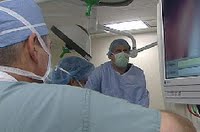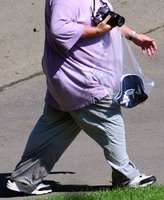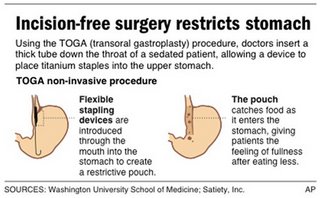Trenton, NJ
Preoperative weight loss is associated with fewer complications after gastric bypass surgery, according to the results of a record review reported in the December issue of Archives of Surgery.
"Despite the improved ability to accurately predict an increase in surgical risk, the optimal preoperative preparation of such high-risk bariatric surgery candidates remains controversial," write Peter N. Benotti, MD, from Saint Francis Medical Center in Trenton, New Jersey, and colleagues.
"Proposed risk-reducing strategies supported by varying degrees of evidence include staged surgical procedures, preoperative gastric balloon placement for weight loss, and preoperative medical weight reduction....Because the major determinant of postoperative length of stay is operative morbidity, we hypothesized that preoperative weight loss will reduce the frequency of surgical complications in patients who undergo bariatric surgery."
At a comprehensive, multidisciplinary obesity treatment center at a tertiary referral center serving central Pennsylvania, the investigators reviewed records of 881 patients undergoing open or laparoscopic gastric bypass surgery from May 31, 2002, through February 24, 2006. Before surgery, all patients underwent a 6-month multidisciplinary program with the goal of achieving a 10% preoperative weight loss. The primary endpoints of the study were loss of excess body weight and rates of total and major complications.
Loss of 5% or more excess body weight was achieved by 592 (67.2%) of the 881 patients and loss of more than 10% excess body weight by 423 patients (48.0%). Compared with patients undergoing laparoscopic gastric bypass surgery (n = 415), those referred for open gastric bypass (n = 466) were generally older (P < .001), had a higher body mass index (P < .001), and were more often men (P < .001). In addition, they had higher total complication rates (P < .001) and major complication rates (P = .03) vs patients undergoing laparoscopic gastric bypass surgery.
Increased preoperative weight loss was associated with decreased rates of total complications (P = .004) and, most likely, decreased rates of major complications (P = .06), based on univariate analysis. In a multiple logistic regression model controlling for age, sex, baseline body mass index, and type of surgery, increased preoperative weight loss predicted reduced rates of total complications (P = .004) and major complications (P = .03).
"Preoperative weight loss is associated with fewer complications after gastric bypass surgery," the study authors write. "We hope that these findings will be confirmed by prospective, controlled trials and that bariatric surgeons will consider this modality for preoperative risk reduction in selected patients who are deemed high risk for complications after surgery."
Limitations of this study include retrospective design, lack of a control group, referral bias, and possible unmeasured confounding variables.
In an accompanying invited critique, Patricia L. Turner, MD, from the University of Maryland Medical Center in Baltimore, recommends emphasizing an aggressive preoperative weight loss regimen.
"Overall, this article presents the largest study thus far, to our knowledge, which may demonstrate a significant advantage to preoperative weight loss," Dr. Turner writes. "Moreover, the authors did not experience the attrition feared by some surgeons should they require preoperative weight loss of their patients. These findings suggest that consideration be given to incorporating either a suggestion of or the requirement for modest weight loss prior to bariatric surgery as a means of decreasing postoperative complications."
Gastric Bypass Surgery Malpractice Lawsuit AttorneyLabels: bariatric surgery, gastric bypass, gastric bypass malpractice lawsuits, gastric bypass risks, gastric bypass side effects, patient stories


















